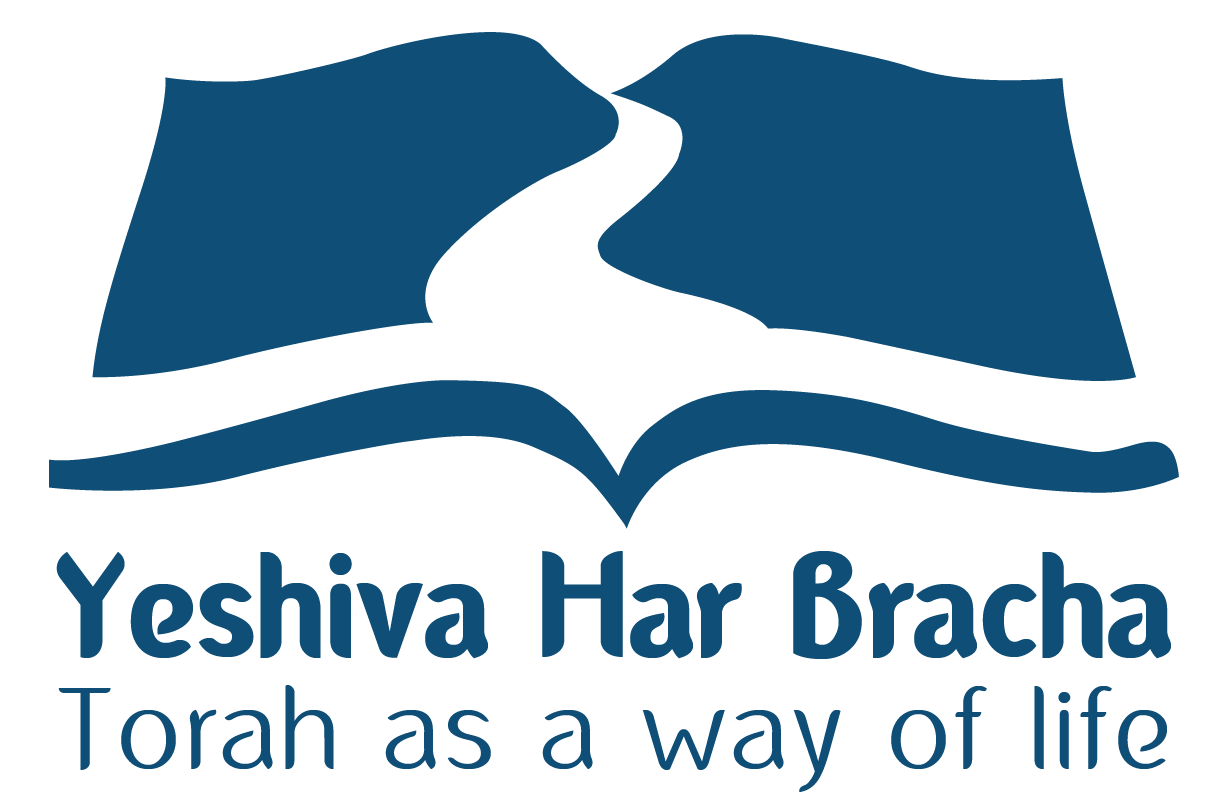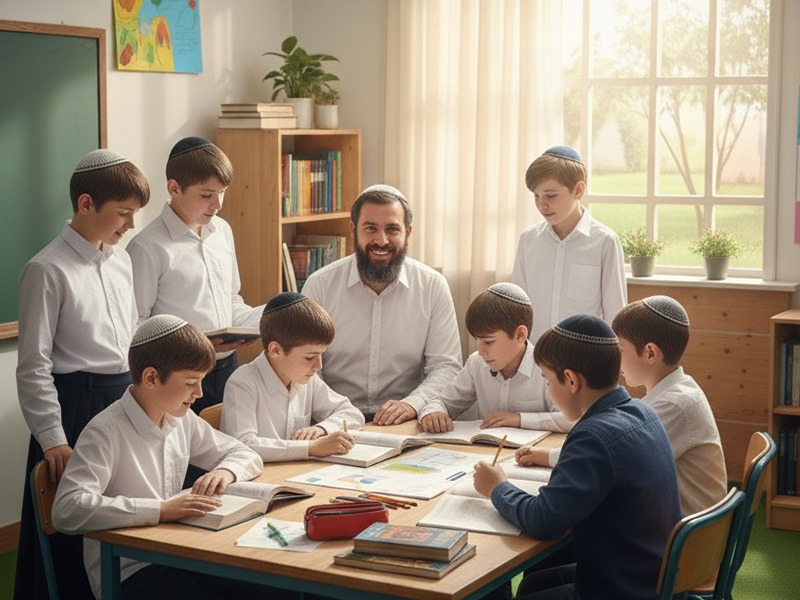One must strengthen in repentance and greatly honor the educators, the teachers of Torah ● To cleave to the character traits of Abraham our father who was entirely “loving his fellow mankind” ● One who fails in this must appease his fellow, since for sins between man and his fellow, Yom Kippur does not atone ● When a person appeases his fellow, the Holy One, Blessed be He, is also appeased with him and forgives sins between man and the Omnipresent ● Rabbi Avraham Yitzchak HaKohen Kook taught us that even one who cannot appease his fellow should not fall into bitterness, for general repentance is beneficial for repair, especially when it is directed for the sake of the community of Israel
Repentance on Recognizing the Value of Education and Teachers
Our Sages said that the commandment of Talmud Torah (Torah study) is equal in weight to all the other commandments, and its reward is equal in weight to the reward of all the commandments (Pe’ah 1:1, and in the Jerusalem Talmud there, and Babylonian Talmud Mo’ed Katan 9b). For without Torah study, we cannot fulfill the commandments properly, as our Sages ruled regarding the question of what is greater, study or practice – “study is greater, for study leads to practice” (Kiddushin 40b).
But we do not always remember that the essence of the commandment of Torah study, is to teach Torah. Thus, it appears in the Torah, as it is said: “And you shall teach them to your children to speak of them” (Deuteronomy 11:19), and it is said: “And you shall teach them diligently to your children” (Deuteronomy 6:7). And our Sages expounded in Sifrei that students are also called children, from here we learn that there is a commandment upon Torah scholars in Israel to teach Torah to students.
This is because the essence of Torah is to instill life to the Jewish nation, that they should walk in the ways of God, and merit divine good. As long as one who studies Torah does not instill it upon his children, and if he merited, upon his students, his Torah is still not the living Torah.
From this we must all awaken to greatly honor the educators, both men and women, who are the teachers of Torah, and everything depends on them. To always remember to thank teachers individually, and generally to praise and elevate those engaged in the work of education, for their work is holy work. They fulfill the role of the tribe of Levi in our days, of which it is said: “They shall teach your judgments to Jacob, and your Torah to Israel” (Deuteronomy 33:10).
And those who spread slander about teachers’ salaries with expressions like ‘one cannot survive on a teacher’s salary’, sin. For in practice, teachers’ salaries in the initial stage are average, and subsequently, they are above average. And this is in this world, “which is a corridor before the world to come” where their reward is above all. And even in this world, one who looks deeply can recognize the truth, and know how great is the virtue of good educators.
One who doubts the value of education can look at the soldiers from the religious-Zionist public, and see their enormous self-sacrifice in defending the people and the Land, with the unbelievable support of mothers and women. How they fulfill the commandments of Torah in the most sublime way. All this is thanks to the men and women educators, in kindergartens, elementary and high schools, in yeshivot and ulpanot, and in higher institutions. The more we appreciate the men and women educators, the more we will merit that the blessed influence of the Torah of the Land of Israel, the Torah of life, will illuminate all our people, and we will merit redemption.
Love of Fellow Human Beings
My teacher and rabbi, Rabbi Tzvi Yehuda HaKohen Kook ztz”l, head of Merkaz HaRav Yeshiva, in a talk before Yom Kippur was accustomed to awaken us to love of fellow human beings, while mentioning the verse “and the evil of each man his brother – do not think in your hearts.” And the entire verse: “Thus says the Lord of hosts: Judge true judgment, and practice kindness and mercy each man with his brother. And do not oppress the widow and orphan, stranger and poor, and do not think the evil of each man his brother in your hearts” (Zechariah 7:9-10).
And he was accustomed to explain in the Mishnah “loves mankind and brings them close to Torah” (Avot 1:12), that it contains two matters that are not dependent on each other. “It does not say: loves mankind in order to bring them close to Torah. That is false love. Love of fellow human beings has intrinsic value, and from this, flows bringing close to Torah. Which humans are we speaking of? Certainly, those distant from Torah, for these are the ones to bring close, and these too, there is a commandment to love” (Talks of Rabbi Tzvi Yehuda Leviticus p. 30). “This is a commandment from the Torah! One must accustom oneself (to fulfill it) for a very long time. This commandment is the foundation of everything. Our Sages say that ‘love your neighbor as yourself’ is the entire Torah. The foundation of everything, the root of everything. Afterward it is possible to explain how, and in what manner” one must combine love and rebuke which is also from love. “One must be cleansed from the impurity of hatred, and from the impurity of hatred of such Torah scholars, and such heads of yeshivot, who desecrate the Name and advocate in the name of Torah to introduce into the atmosphere of the world hatred of fellow man, God save us, may God protect us!” (Talks of Rabbi Tzvi Yehuda Middot p. 35; Am Yisrael p. 212).
“There are those who ‘seize’ a verse from Psalms: ‘Do I not hate those who hate You, O Lord,’ and there are educational approaches that emphasize this in a special way, as a foundation in education. They establish the trait of hatred of fellow man as a foundational basis, with the claim that thus, they protect themselves. It is interesting that we never heard that they (Chazal) called a righteous and great person in Israel by the appellation: ‘Hater of Israel.’ On the other hand, we heard about special ones who merited the appellation: ‘the righteous Gaon (genius) and holy one, Lover of Israel'” (from The Redeeming Torah part 4, p. 160).
A True Torah Scholar Loves Human Beings
Our teacher and mentor, Rabbi Tzvi Yehuda, further taught us: “Abraham our father is called ‘Abraham my beloved.’ He is entirely ‘loving his fellow man.’ Only on the foundation of Abraham our father do we reach Moses our teacher. Torah reaches us from ‘Moses received Torah from Sinai,’ but our character traits are from Abraham our father. Moses our teacher is the grandson of Abraham our father: one does not merit Torah except on the foundation of the pure, refined and meritorious character traits of Abraham our father. The more a Torah scholar is more learned, the more he is suitable for the definition of Torah scholar called ‘Moses our teacher’ – the more he must be full of love of mankind” (Talks of Rabbi Tzvi Yehuda Midot p. 13).
If so, we learned from the words of Rabbi Tzvi Yehuda ztz”l, that there is a necessity to precede the value of love of fellow human beings, to the value of Torah study and its meticulous observance. For Torah is intended to bring blessing to man, therefore one must always be a human being first, reveal his value, and from this, he will be elevated through Torah guidance. Without this, Torah is liable to turn into a poison of death for him, to make him an evil-eyed person, and a person of strife. God loves His creatures while this person, in his wickedness, supposedly in the name of Torah, hates God’s creatures.
Tikkun Between Man and His Fellow Comes First
Our Sages said: “Sins between man and the Omnipresent – Yom Kippur atones, sins between man and his fellow – Yom Kippur does not atone until he appeases his fellow” (Mishnah Yoma 8:9). And even if he offers all the sacrifices in the world and increases in prayers and fasts, he is not forgiven without appeasing his fellow (Bava Kamma 92a).
Therefore, one must first repair the sins between man and his fellow, for if not, even if he exerts himself greatly to repent for sins between man and the Omnipresent, since he is defiled with sins between man and his fellow, he cannot draw close to God. Similarly wrote the Ri”f on ‘Ein Ya’akov’ (Yoma 8:9), that as long as he has sins between man and his fellow, even the atonement of sins between man and the Omnipresent depends on his first appeasing his fellow. “And since he appeases him and placates him, then the Holy One, Blessed be He, is appeased with him to atone for his sins that he sinned between him and the Omnipresent” (and see Birchei Yosef 606:1; Kaf HaChaim 606:3).
Similarly, our Sages said that derech eretz (proper conduct) preceded Torah (Tana D’bei Eliyahu 1; Leviticus Rabbah 9:3).
One Who Cannot Repair Sins Between Man and His Fellow
Sometimes it is not within a person’s ability to repair the sins he sinned between man and his fellow, such as one who stole from many people and does not know from whom he stole, or insulted many people or a group, and cannot placate them all. And sometimes the damage he caused to his fellow is so great that there is no possibility to repair it.
But he must not despair of repentance, but repair according to his ability. And as Maran Rabbi Kook wrote: “And if he finds in himself sins between man and his fellow, and his strength is weak to repair them, in any case he should not despair at all from the great repair of repentance, for behold the sins between man and the Omnipresent that he repented for are forgiven,” and then it is possible that most of the sins were atoned for him, and the sins between man and his fellow that he did not repair “will be nullified in the majority… and in any case he should not remove his hand from being very careful not to stumble in any sin between man and his fellow, and to repair all that he can from the past, with wisdom and great courage” (Orot HaTeshuvah 7:6). And similarly, there (Orot HaTeshuvah 10:6), that even if he did not succeed in repairing sins between man and his fellow, and consequently as long as he did not merit to repair them, they prevent from him the light of knowledge and recognition of general justice. “In any case through strong agreement to be careful at least in the future from sinning against people, and to exert oneself in repairing the past, according to that measure of the establishment of repentance in deed (that he not continue to sin), so the spiritual light will continue to shine on the soul, until courage of spirit itself will increase for him ways how to complete practical repentance, so that the spiritual light can dwell on the soul that thirsts for it, in all its fullness and all its goodness.”
General Repentance Repairs Somewhat Even Sins Between Man and His Fellow
Further wrote Maran Rabbi Kook, regarding one who cannot repair all that he sinned between man and his fellow, that he indeed must grieve over this greatly and try to repair according to all his ability, but nevertheless he should not prevent himself from rejoicing over the repentance he did, especially when it is directed for the sake of Clal Yisrael (the entire community of Israel). For although he himself did not merit to repair properly, in any case through his repentance “he benefits the entire world in that he increases divine light in his individual soul.” And since his soul “is included in the totality of worlds and in the totality of souls, and in the totality of souls of Israel especially, if so, he illuminates and benefits through this also his victims, and there is in this also some repair of the damages between man and his fellow” (Shmoneh Kevatzim 1:427). He further wrote: “A person should not cease from Torah and from service and from rest of soul for any reason in the world, even when his heart is very bitter regarding spiritual matters, and he thinks in his mind that he is a transgressor, that he has no repair, God forbid. Even if his failures multiplied in matters between man and his fellow, that repentance also does not atone without repairing the wrong, in any case he will go in his way in service and Torah, and in joy and good heart” (Shmoneh Kevatzim 1:392).
This article appears in the ‘Besheva’ newspaper and was translated from Hebrew.








